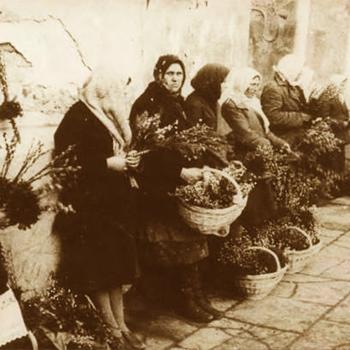- Elijah rock comin’ up Lord
- Elijah rock shout shout
- Elijah rock comin’ up Lord
- Elijah, Elijah
- Elijah
- Elijah, Elijah
- Elijah
- Satan is a liar and a conjure too
- If you don’t watch (mind) out
- He’ll conjure you
- If I could I sho’ly would
- Stand on the rock where Moses stood
- Ezekiel said he saw him
- Wheel in the mid’ of a wheel
- John talked about him
- Book of the seven seals
- Some say the Rose of Sharon
- Others say the Prince of Peace
- But I can tell everybody (this ol’ world)
- He’s been a rock and a shelter for me
- You can call my rock in the mornin’
- Call him late at night
- He’s always with me
- And all my battles He’ll fight
- When I’m in trouble
- I can call him on the line
- He put a telephone in my heart
- And I can call God anytime
I see how in the Roman calendar today is the feast of Elijah.
I find him interesting for a number of reasons. For one he remains a signal figure in all three religions of the book.
He is one of the figures in the Bible who do not die, but rather ascends to heaven in a fiery chariot. After which he makes occasional guest appearances, such as at Jesus’ ascension.
In Western lore he wanders the earth, and encountering him can be life transforming. So, a seat is reserved for him at Passover. I’ve also heard him identified with the Islamic Green Man, Al-Khidr, although poking about the web I see this is not a common identification. Although the stories of the green man and stories of Elijah show similarities, even are on occasion the same story…
Here’s one typical anecdote relating encounters with Elijah:
Elijah appeared to many while they were awake, and this in various ways. He often elected to appear in the guise of an Arab ( ) or, more exactly, in that of an Arab of the desert
) or, more exactly, in that of an Arab of the desert  (see Arabia in Rabbinical Literature). In this manner he once appeared to a poor but pious man, and asked him whether he wished to enjoy the six good years which were appointed him now, or at the end of his life. The pious man took him for a sorcerer, and made no reply. But when Elijah came the third time, the man consulted his wife as to what he should do. They concluded to tell the Arab that they wished to enjoy the good years at once; they had hardlyexpressed their wish when their children found a great treasure. The pious couple made good use of their riches, and spent much money for benevolent purposes. After six years the Arab returned and told them that the end of their prosperity had come. The woman, however, said to him: “If you can find people who will use with more conscientiousness what you give unto them, then take it from us and give it to them.” God, who well knew what use this pious couple had made of their wealth, left it in their hands as long as they lived (Midr. Ruth Zuṭa, ed. Buber, near end).
(see Arabia in Rabbinical Literature). In this manner he once appeared to a poor but pious man, and asked him whether he wished to enjoy the six good years which were appointed him now, or at the end of his life. The pious man took him for a sorcerer, and made no reply. But when Elijah came the third time, the man consulted his wife as to what he should do. They concluded to tell the Arab that they wished to enjoy the good years at once; they had hardlyexpressed their wish when their children found a great treasure. The pious couple made good use of their riches, and spent much money for benevolent purposes. After six years the Arab returned and told them that the end of their prosperity had come. The woman, however, said to him: “If you can find people who will use with more conscientiousness what you give unto them, then take it from us and give it to them.” God, who well knew what use this pious couple had made of their wealth, left it in their hands as long as they lived (Midr. Ruth Zuṭa, ed. Buber, near end).
In my own life I try to remember to make sure there is always a place for “Elijah,” for the visitor, to church or to our Zen groups.
After all, one never knows, who might walk through the door…
http://www.youtube.com/watch?v=60oujzdxSO4












